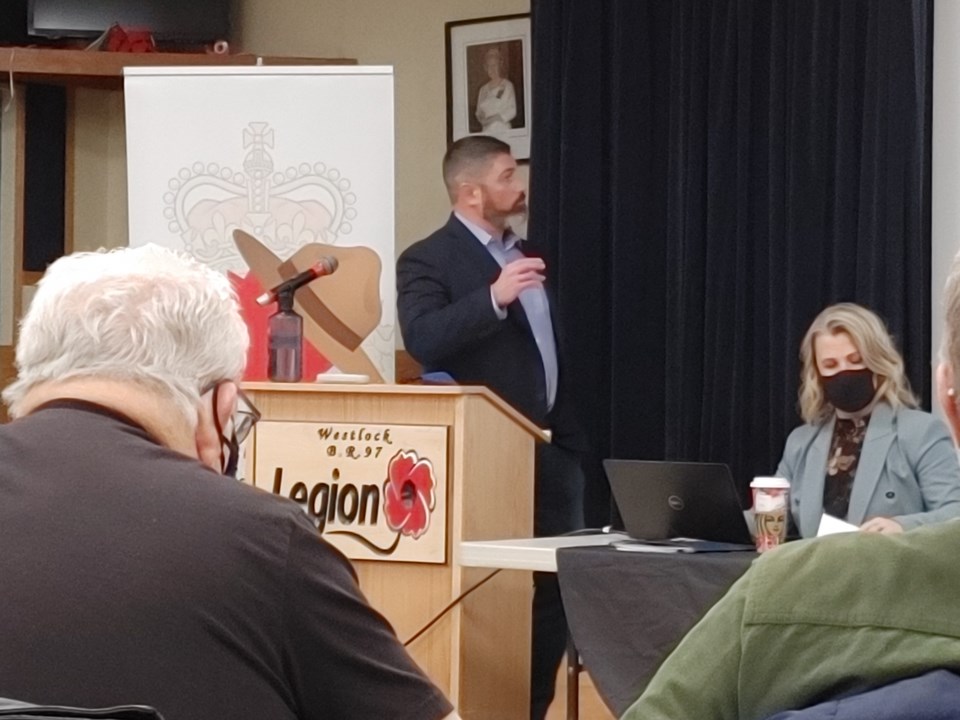WESTLOCK – Members of the National Police Federation (NPF), the sole bargaining agent for the RCMP, came to Westlock Jan. 10 to bring “clear and fact-based information” to residents regarding the Government of Alberta’s proposed provincial police service.
Just under 20 people showed up to the Westlock Legion building for the presentation titled The RCMP: Alberta’s Provincial Police Service where NPF speakers including directors of the northern and prairie region Kevin Halwa and Jeff McGowan as well as vice-president Michelle Boutin shared their reasons to keep the RCMP as Alberta’s main form of law enforcement.
“The public needs to know the risks of not only the costs but also public safety if the government chooses to go down this road,” said Halwa in an interview shortly after his presentation.
In October 2020 the Government of Alberta hired PricewaterhouseCooper (PwC) to put together a $2 million report that was publicly released in November 2021 titled APPS Transition Study, which explored the feasibility of a provincial police force to replace the RCMP, something Halwa has said will cost Albertans millions of dollars.
Currently, Alberta RCMP costs the province $595 million annually, of which $188 million is provided through the federal government. The two proposed models by the government would cost Albertans $734 million and $759 million without any supplementation from the federal government while hiring fewer officers, according to the report released in November.
Using Surrey B.C. as an example, Halwa highlighted concerns regarding the transition period going over budget. In Surrey, the transition cost was tagged at $19 million but had ballooned to $80 million, a 400 per cent increase. The Alberta study anticipated transition costs of over $300 million which Halwa claims could increase to over $1 billion if it goes over budget.
“That’s money that will have to come from elsewhere,” Halwa said, noting the province claimed there would not be an increased cost to rural municipalities. “How the province even remotely suggested that cost won’t impact municipalities is beyond me.”
In addition to the increased costs associated with a potential provincial police force Halwa highlighted the RCMP programs like crime reduction units, community policing programs and rural crime watches.
“It quite frankly has taken many, many years and decades to get (RCMP programs) to where it is,” said Halwa. “To think that those very important community programs can be duplicated in a short period of time is nonsensical.”
Additionally, Halwa noted the difficulty of staffing a new police force. He says there has been a drought in recruits recently and that many Alberta RCMP members would be deployed elsewhere with very few joining the APPS. Again, Halwa pointed to Surrey once again which he says has had difficulty filling ranks due to low interest in enforcement positions.
“I suspect that if the government continues to go down this road to a provincial police force we will see those very low numbers joining APPS and some of them wanting to move back (to the RCMP),” said Halwa. “Imagine how difficult it will be to staff a new police service. It’s challenging and these are all questions that have not been answered.”
Finally, Halwa highlighted the lack of communication from the province, noting many of the NPF’s questions have gone unanswered. These questions include inquiries regarding where the additional funding will come from without the 30 per cent federal support, how the positions will be filled and why the government didn’t approach Alberta RCMP on how to better the current systems in place.
He says that this has led to soured relations between RCMP and government and may cause RCMP members to have “second thoughts about transferring” to Alberta.
“It’s disappointing, to say the least,” Halwa said. “It’s concerning in that it’s destabilized how members feel about being in Alberta."
Westlock will be given an opportunity to hear the other side of story when the Government of Alberta hosts an APPS engagement session Feb. 17 to focus on “key concepts presented in the transition study” at the Westlock Inn & Conference Centre.



